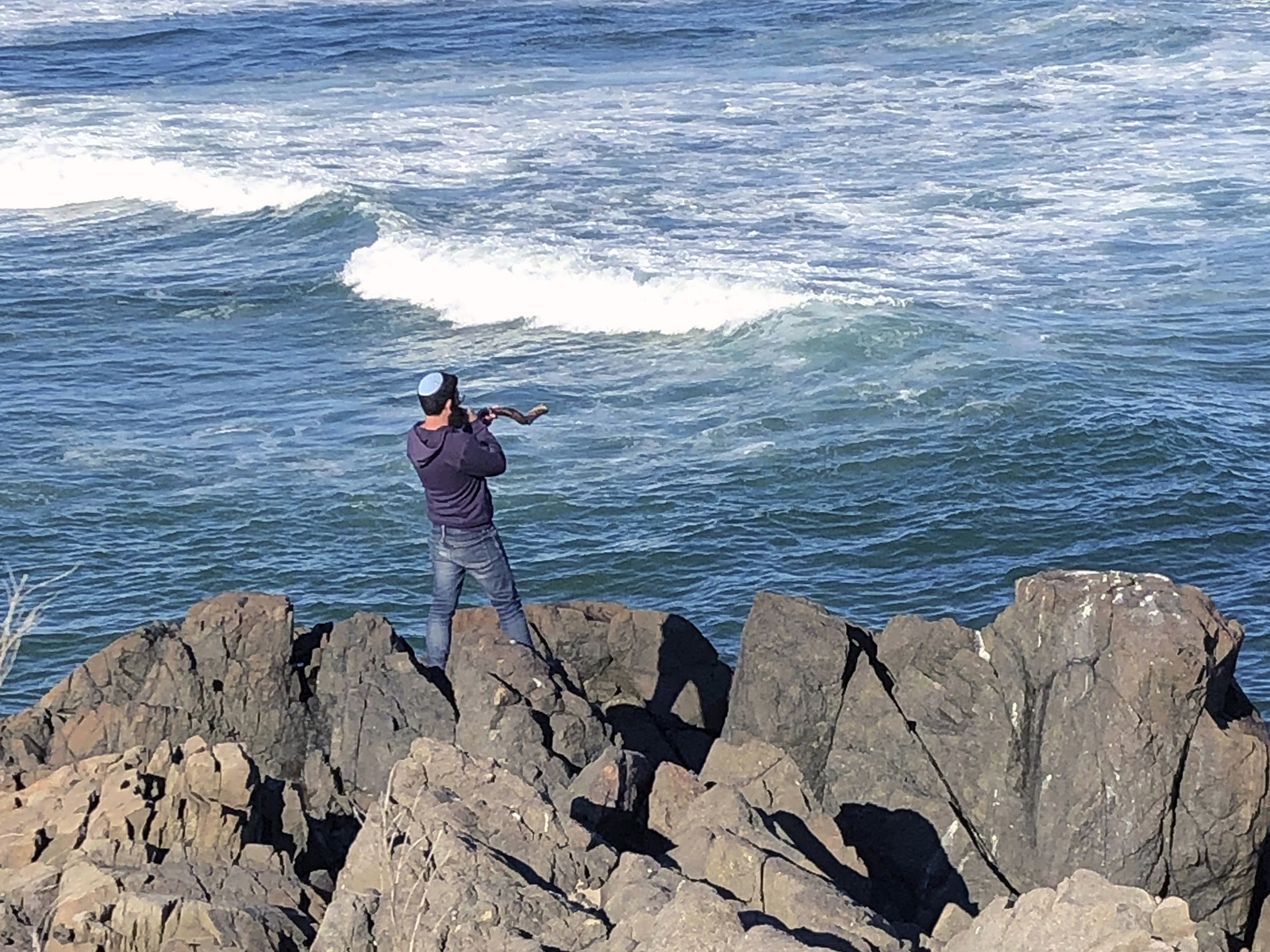(RNS) — When is the shofar service? What time are they blowing the shofar?
These are the burning questions at most synagogues this time of year as Rosh Hashana approaches. The answers lead temple announcements and synagogue bulletins as well as ads for the increasingly popular phenomenon of pop-up High Holiday worship gatherings.
This year especially, all people, whether they observe the holiday or not — whether they are Jewish or not — can benefit from the lessons of the shofar.
Regardless of denomination, location or most any other difference, the shofar stands at the ritual center of Rosh Hashana, and with good reason: Besides being dramatic and, yes, loud, the blowing of the shofar has been in continuous practice for as many as 3,500 years.
RELATED: Blowing shofars, Jewish lawmakers, rabbis hold abortion rights ‘sho-test’
In fact, the blowing of a ram’s horn, shofar in Hebrew, is actually older than Rosh Hashana itself. It is mentioned in the Bible — Leviticus 23:24 and Numbers 29:1 — centuries before there was a holiday called Rosh Hashana — literally, the “head,” or first of the year.
While the change of years was noted in biblical times, there was no autumn holiday called Rosh Hashana. Instead, biblical Israelites began their year in the spring, when the Exodus from Egypt occurred. The first month in the Bible was Nissan, not Tishrei, the month when people have observed Rosh Hashana for the past 2,000-plus years.
What happened?
The short answer is that over time, the Jewish people decided to measure time from the creation of the world and of all of humanity, not from the founding of their/our particular nation. Like the Bible, which begins with the story of humankind prior to the existence of any nations or religions, the Jewish liturgical calendar came to follow suit, and with that, Rosh Hashana was born.
Blowing the shofar, then, is the bridge that connects people to both their national story and the larger human story of which we are all a part. It’s a ritual in which all people can participate, requiring no specific knowledge, and available to any and all who care to be within earshot. Blowing the shofar is biblical, malleable and broadly democratic. It is both deeply particularist and a celebration of the universality of human experience.
Blowing the shofar, according to a wisdom that has been encoded in Jewish tradition for the last 2,000 years, however, is not as important as hearing the shofar. As with the decision to mark time from the creation of all of humanity, it is a wisdom we all need now more than ever, regardless of the faith we choose to follow, or ignore.
The blessing recited upon blowing the shofar is not about blowing it, at all! The blessing is recited for hearing it. And in a world with more opportunities than ever to sound off, and more and more people availing themselves of those opportunities, our ability to listen and hear — to really listen and hear — is more challenged than ever.
In her 2020 book, “You’re Not Listening,” Kate Murphy observes that contemporary life is especially antagonistic to good listening. “We are encouraged to listen to our hearts, listen to our inner voices, etc.,” Murphy writes, “but rarely are we encouraged to listen carefully and with intent to other people” — especially, she adds, those whose views and conclusions differ sharply from our own.
Enter the shofar on Rosh Hashana.

A man blows a shofar to celebrate the end of Rosh Hashana on the Marginal Way, Sept. 20, 2020 in Ogunquit, Maine. (AP Photo/Pat Eaton-Robb)
By centering us on the hearing of the sound, and not the making of the sound, the shofar reminds us that unless we are listening, even the most ancient and sacred sounds are not worthy of blessings. We need to listen up, or the entire ritual is pointless.
And therein is the message for our moment. Listening and hearing are more important than talking and being heard.
Listening and hearing well, of course, are easier said than done, even for those of us who consider ourselves good listeners. Lately we see people using the shofar more as a megaphone than an invitation to listen. I count in this phenomenon the recent “sho-test” — short for “shofar protest” — in which progressive Jewish groups blew a shofar at abortion rights rallies.
To be fair, shofars, according to the Hebrew Bible, were also used as battle horns, so it’s not like this use is without precedent. It is, however, sadly ironic to see see folks who champion the separation of church and state using shofar in a way that reflects its past as a call to wars conducted in the name of God. At the very least, those doing so might want to at least consider what the shofar being blown at these “sho-tests” is calling them to hear, not just what the blowers would like others to hear.
Here are four way to open our ears, and open our hearts and minds, without diluting the passion any of us might feel about whatever cause we choose to champion:
Listening well often means listening for surprise. Ask yourself when and where you hear things that surprise you, and what you can learn from those surprises.
Listening well often means that the listener is changed by the act of listening. Ask yourself when was the last time you were changed, even a little, by someone you heard.
From biblical battle horns to the ram that Abraham substituted for Isaac, who almost became a human sacrifice, the shofar is rooted in risk-taking. What risks do we take in really listening to others, and how can we find the courage to do so?
The shofar is also linked to announcing liberation in the Bible. How can listening liberate us to be more who we want to be?
RELATED: Meet the student-turned-model who is putting AI to good use with her Robo Rabbi
With spiraling suspicion across most every political, cultural and spiritual divide, listening and hearing have never been more necessary. With the shofar and the blessing recited when it is blown as our model, we can learn to listen and hear better, for ourselves, for each other and for our world.
(Rabbi Brad Hirschfield is president of the National Jewish Center for Learning and Leadership. The views expressed in this commentary do not necessarily represent those of Religion News Service.)





